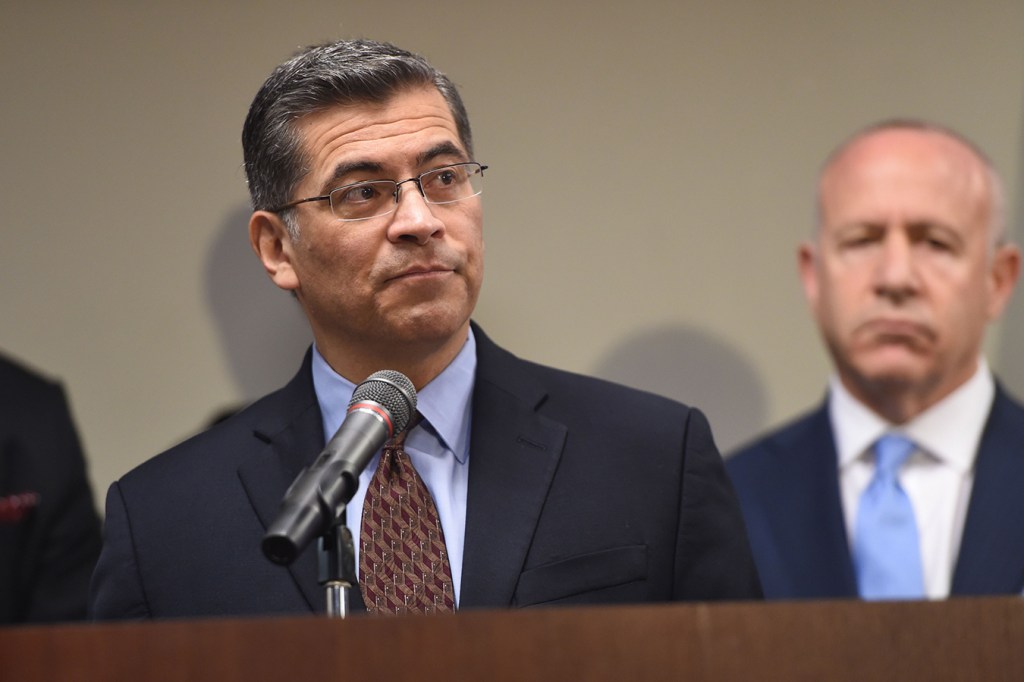California Attorney General Xavier Becerra pledged Friday to redouble his efforts as the Affordable Care Act’s leading defender, saying attacks by the Trump Administration threaten health care for millions of Americans.
Becerra’s pledge came in response to an announcement from the administration Thursday that it would not defend key parts of the Affordable Care Act in court. The administration instead called on federal courts to scuttle the health law’s protection for people with preexisting medical conditions and its requirement that people buy health coverage.
Becerra accused the administration of going “AWOL.” It “has decided to abandon the hundreds of millions of people who depend on” the law, he said in an interview with Kaiser Health News.
“It’s, simply put, an attack on the health care that millions of Americans have come to count on, and California, being the most successful state in implementing the Affordable Care Act, stands to lose perhaps more than anyone else.”
About 1.5 million Californians buy coverage through the state’s ACA exchange, Covered California, and nearly 4 million have joined Medicaid as a result of the program’s expansion under the law.
The state has been at the forefront in resisting many Trump Administration policies, including on health care and immigration.
“This is not a new experience for us under this new Trump era of having to defend Californians,” Becerra said. In the case of health care, “fortunately we have 16 other [Democratic attorneys general] who are prepared to do it with us. ”
At issue is a lawsuit filed by 20 Republican state attorneys general on Feb. 26, which charged that Congress’ changes to the law in last year’s tax bill rendered the entire ACA unconstitutional. In the tax law, Congress repealed the penalty for people who fail to have health insurance starting in 2019.
Becerra is leading an effort by Democratic attorney generals from others states and the District of Columbia to defend the ACA against that lawsuit. In May, the court allowed them to “intervene” in the case.
The Trump administration filed a brief in the case on Thursday, arguing that without the tax to encourage healthy people to sign up, the parts of the law guaranteeing coverage to people with previous health conditions — without charging them higher rates — should be struck down as well.
In a letter to House Speaker Paul Ryan explaining the administration’s decision, U.S. Attorney General Jeff Sessions cited the Justice Department’s “longstanding tradition” of defending the constitutionality of federal laws “if reasonable arguments can be made in their defense.”
But in this case, he wrote, he could not find those arguments to defend the constitutionality of the provisions and “concluded that this is a rare case where the proper course is to forgo defense.”
The administration called on the court to declare the provisions that guarantee coverage to be invalid beginning on January 1, 2019, when the mandate penalty goes away.
Because the lawsuit could easily go all the way to the U.S. Supreme Court, a process that could take years, the protections for people with preexisting conditions are likely to stay in place during that period.
Lieutenant Governor Gavin Newsom, the Democratic front-runner in the race for California’s next governor, breathed the same fire as Becerra against the federal government on Friday.
“Trump and his cronies can’t unilaterally roll back preexisting protections for millions of Californians,” Newsom said. “California will fight like hell to protect our families and their healthcare.”
A spokesman for his opponent in the race, Republican gubernatorial candidate John Cox, declined to comment.
If the court ultimately declared the provisions targeted by the Trump Administration unconstitutional, California would be temporarily cushioned from the effects because there are laws already on the books should the ACA – or its provisions – go away.
For instance, existing rules would protect people with pre-existing conditions for twelve months if the ACA were struck down.
During that time, “policymakers in California would look really hard at being able to try to do something so we don’t lose those gains,” said Deborah Kelch, director of the Insure the Uninsured Project in Sacramento.
“It’s hard to look at California and imagine just folding it up and starting over.”
Some critics of the administration’s decision said California should go forward with enacting its own mandate for individual coverage, as a few other states have done. No one has pushed that issue forward in the Legislature.
Since he took office in January 2017, Becerra has emerged as a top opponent of the Trump administration, filing more than 30 lawsuits on health care and other issues.
In California’s primary election Tuesday, Becerra, a Democrat, dominated the race with 45 percent of the vote. He will face retired judge Steven Bailey, a Republican, in the November general election.
Bailey’s spokesman Corey Uhden said Friday that he wouldn’t comment on the constitutionality of the ACA provisions. However, he said, Bailey opposes the individual mandate and wants less government regulation of health insurance.
Alex Leeds Matthews contributed to this report.
This story was produced by KFF Health News, which publishes California Healthline, an editorially independent service of the California Health Care Foundation.







